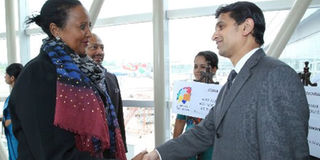President Uhuru opts for Gulf talks

PHOTO | FILE Cabinet Secretary for Foreign Affairs and International Trade Amb. Amina Mohamed is received by a government official upon her arrival at Bandaranaike International airport in Sri Lanka for the Commonwealth Heads of Government Meeting (CHOGM) 2013 beginning in Colombo, Sri Lanka.
What you need to know:
- State House on Thursday said Mr Kenyatta will be going to Kuwait “because the President has an economic transformative agenda”.
- Mr Esipisu said Mr Kenyatta’s visit to Kuwait for the third Africa-Arab Summit set for November 19 and 20 was meant to fulfil his pledge of helping transform the economy.
- Queen Elizabeth II, the head of the Commonwealth, will also not be attending the Sri Lanka meeting due to old age. She is 87. However, she will be represented by Prince Charles, who has in recent months taken on more of the royal duties.
- Next week, Ms Mohamed will proceed to The Hague to attend the 12th session of the Assembly of States Parties of the International Criminal Court where Kenya is planning to present its issues against the ICC.
President Uhuru Kenyatta will skip the Commonwealth Heads of Government Meeting in Sri Lanka and instead attend a conference in Kuwait where investment in the energy sector is one of the issues to be discussed.
State House on Thursday said Mr Kenyatta will be going to Kuwait “because the President has an economic transformative agenda”.
His spokesman, Mr Manoah Esipisu, denied that Mr Kenyatta was skipping the Commonwealth meeting because of the position that western countries have taken on the Kenya cases at the International Criminal Court where the President and his deputy are facing crimes against humanity charges.
Mr Esipisu said Mr Kenyatta’s visit to Kuwait for the third Africa-Arab Summit set for November 19 and 20 was meant to fulfil his pledge of helping transform the economy.
“This includes additional 5,000 megawatts of electricity to the national grid in the next 36 months,” he said in a telephone interview. “The Africa-Arab conference addresses some of the issues in terms of accountability to Kenyan people. Kuwait offers more in terms of tangible deliverables.”
FOCUSSING ON OTHER THINGS
He said the President could not attend both the Commonwealth and Kuwait meetings as it would have meant him being out of the country for nine or 10 days at the time when he was focusing on Kenya @50 events leading to the December 12 independence celebrations.
Several other African presidents have also indicated that they will skip the Commonwealth meeting, an indication of the club’s declining influence. The club brings together former British colonies and the last time a commonwealth meeting was held in Africa was in 2007 in Uganda.
Other African presidents who are likely to miss the Commonwealth talks but attend the Kuwait meeting are Uganda’s Yoweri Museveni and Nigeria’s Goodluck Jonathan.
Queen Elizabeth II, the head of the Commonwealth, will also not be attending the Sri Lanka meeting due to old age. She is 87. However, she will be represented by Prince Charles, who has in recent months taken on more of the royal duties.
This is the first time in 40 years that Queen Elizabeth will miss the meeting. In 1971, the Queen stayed away from the Commonwealth meeting in Singapore after the then British prime minister Edward Heath advised her not to attend because of a row about Britain selling arms to South Africa.
This year, Kenya will be represented by Foreign Affairs Cabinet Secretary Amina Mohamed who arrived in Colombo on Wednesday.
GIVE PRIORITY TO THE YOUTH
A statement from the Presidential Strategic Communication Unit said Ms Mohamed expressed optimism that this year’s meeting will give priority to youth empowerment, opportunity for investment and growth.
“The youth constitute a large percentage of the Kenyan population and all programmes that support their growth are welcome,” the Cabinet Secretary said.
Ms Mohamed said the Commonwealth should use all resources at its disposal to expedite equitable economic growth of member countries.
“That is what we are basically looking for at this meeting — that we can grow equitably and in an inclusive manner,” Ms Mohamed said.
The meeting, whose theme is “Growth with equity; inclusive development”, officially opens today.
It will discuss international peace and security, democracy, good governance, sustainable development, debt management, education, environment and gender equity. Other issues slated for review include health, human rights, information and communication technology, law, multilateral trade, small states and youth affairs.
Ms Mohamed also held bilateral talks with New Zealand’s Foreign minister, Mr Murray McCully and thanked his government for supporting Kenya’s agriculture and energy sectors.
ANOTHER MEETING
She also met the Australian Foreign minister, Ms Julie Bishop, and discussed the tripartite agreement that was signed last Sunday between Kenya, Somalia and the United Nations High Commission for refugees (UNHCR).
The agreement establishes a legal framework and other support for Somali refugees in Kenya who wish to return to their homeland.
Ms Mohamed and Ms Bishop also discussed the existing collaboration between Kenya and Australia in education and other areas of mutual interest.
Australia has been at the forefront in providing higher education opportunities to thousands of Kenyan students.
Next week, Ms Mohamed will proceed to The Hague to attend the 12th session of the Assembly of States Parties of the International Criminal Court where Kenya is planning to present its issues against the ICC.
An official at the Foreign Ministry said that the deferral of the Kenya cases, which is being pushed by the African Union, would feature at the meeting.
Additional reporting by ISAAC ONGIRI





